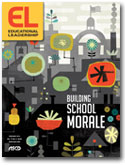When interviewing teacher candidates, how can you get beyond the background, preparation, and experiences that are listed on their résumés? How can you know they'll fit?
Begin by making sure someone is helping you interview. I'm always amazed at how differently people hear the same answers. Beyond what I learn, staff members appreciate the opportunity to offer input on who joins their team, and I need to know which candidates my colleagues feel comfortable working with. The interviewing team knows the final decision is mine, but they know I value their input. Plus, discussing candidates' strengths and fit is a wonderful collegial exercise. It's also important to interview candidates more than once; people often come across differently during a second meeting.
Once you have the candidate in the interview room, what can you ask that will yield insights into his or her personality and performance? Interviewing is more art than science, so I asked other educators for their favorite questions. No surprise, their responses were very interesting! Mike, for example, asks candidates, "You come to a fork in the road; how many choices are there?" and "Where does control sit in your classroom?" The first question gives him a sense of candidates' ability to respond quickly and creatively, and the latter gets to their education philosophy.
Most questions yielded more information about the candidate or about his or her approach to teaching. "Tell me your life story," is how Carl opens the interview. Liz is interested in whether applicants talk about family, jobs, pets, or hobbies. She says, "Typically the extroverts take off, and the introverts find this harder to manage. If the latter, I know I have more work to do to draw out the person in the interview." Of course, when asking personal questions, it's important to be aware of what kinds of questions you cannot ask, such as those requiring candidates to reveal their age, marital status, or religion.
Carl also asks candidates to tell a joke. "It can be jarring, but it also can be telling. It changes the game a little and allows me to see the candidate in a different light." Melissa asks, "Give three adjectives that your colleagues would use to describe you." Tim's question, "Tell me about an influential teacher in your life," brings together the personal and the professional and, he says, "gives some insights into the kind of teacher they are or hope to be."
The most often asked question is, "What are you reading?" That answer speaks volumes about the candidate's interests and identity. (In my mind, candidates who cannot name a book get a red X!) Carly takes a slightly different route by asking, "What book would you recommend that we read and discuss as a faculty?"
Interviewers find a variety of ways to get at candidates' approach to teaching. "Describe your all-time favorite student" is Lars's favorite question. He believes that "a great teacher should always be able to tell you about those students who are hard to reach because of personality or learning style." Marshall asks, "You just taught the best lesson and had the best unit—or at least you thought you did. How do you know they 'got' it?" Ron asks whether content knowledge or skills are more important. (The correct answer is both, he says.)
Quite a few people ask candidates how they learn from failure. Bahram, from Iran, asks, "Tell me about one of your worst learning experiences at school. What was wrong about it, and how would you correct or improve it if you could?" Rob says, "The question that seems to reveal the most is, 'What have you failed at that you really wanted, and what did you do about it?' Almost any answer is good as long as it is honest and authentic."
Roger's questions illustrate his belief that reflection is integral to growth: "When have you said to yourself, 'Boy, I have really goofed up this time'?" "What are the two toughest things you have had to overcome?" and "What haven't you overcome or mastered even though you've given it your best?" Similarly, Clark says, "What do you wish someone, a veteran teacher or administrator, had explained to you before you began your teaching career?" Another way to elicit reflection comes from Jean: "Who has been your favorite boss and why, and who has been the hardest to work for?" These responses give insights into what candidates value in a leader and their receptivity to feedback.
Cheryl offers scenarios: "You are at the copier before school starts. It's jammed, and you are already frustrated when a parent approaches you and blurts out, 'My son is bored in math.' How do you react?" Or "Teachers are venting about an annoying colleague in the work room, and they look up at you, waiting for you to state an opinion. What do you do?"
Questions that speak to values, education philosophy, and techniques are always valuable. Deb asks, "Why do you think there is an achievement gap between white and nonwhite students, and what does this mean to you in the classroom?" Mike offers, "If you could design your ideal middle school, what would it be like?" whereas Rob asks, "What is the relationship between nature and nurture, and how does this affect your teaching?"
Reflection and candor are things that I seek, so I always say, "Pretend that we magically convened all of your previous supervisors in this room. I tell them that we are impressed by you but that no one is perfect, so what's something you need to work on?" This always elicits insightful responses (the worst being "I work too hard"). A candidate who doesn't know or won't share is not someone I would hire. My final question is, "What questions do you have for us?" The responses speak volumes about priorities, political sophistication, and values.
How about you? What do you like to ask?

